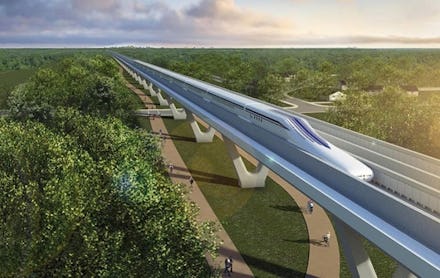Think America's Public Transit Sucks? There's One Group You Can Blame

The Koch brothers.
You've probably heard about Charles G. and David H. Koch, the incredibly wealthy libertarians at the helm of Koch Industries. Their combined net worth recently soared beyond $100 billion. And using that wealth, they've built a massive network of political donors designed to push a libertarian agenda.
Part of that agenda is to push against government-funded initiatives. The Kochs are ideologically opposed to public transportation. Mass transit projects require government revenue. Thus, mass transit has become the enemy for many conservatives.
Take Tennessee for instance. It all started with a political catfight over Nashville's Amp, a proposed bus rapid transit system (BRT) in the city. The 7.1-mile line would cost the city $174 million, but would significantly reduce congestion and commute time, stimulate the economy and cut down on pollution.
But instead of debating the merits of Amp, the Tennessee Senate voted last month to simply ban "constructing, maintaining, or operating any bus rapid transit system." Since then, it has backed off a bit by granting the legislature veto powers over any future BRTs, even if they don't require any state funding.
So while it looks like Amp may not be dead after all, the question still remains: Why did the legislators take such a dramatic, preemptive step against all future BRT systems in Tennessee? As they always say, all you have to do is follow the money ... super PAC money in this case.
The Koch connection: BRTs are cheaper than light rail systems and more effective than traditional bus service, but they require a dedicated bus lane and traffic signal priority. Understandably, some drivers are upset about losing a lane, and property owners are worrying about having a mass transit system run straight through their neighborhood.
But in this case, Tennessee legislators had notable supporters: the famously conservative Koch brothers.
The Tennessee branch of the billionaires' super PAC, Americans for Prosperity (AFP), has been behind the movement against Amp from the very beginning, and are even responsible for its inception.
"StopAmp.org Inc., the leading opposition group, thanked AFP in a news release Thursday, and Andrew Ogles, AFP's state director, said that the group didn't back the effort financially but that the bill grew out of a conversation he had had with Sen. Jim Tracy, the sponsor," reported the Tennessean.
It makes sense that the Koch brothers, who are against government spending and infrastructure, would oppose mass transit on principle. But why would AFP care about a small beans BRT like Amp? According to its own personnel, Tennessee is a good place to set a precedent for other states. "With supermajorities in both houses," Ogles told the Tennessean, "Tennessee is a great state to pass model legislation that can be leveraged in other states."
In other words, AFP suggested a law they could test-drive in Tennessee, all so it can be rolled out across the country to stop the spread of BRTs and other mass transit systems.
America is falling behind. In case you need more convincing, this GIF highlights how public transit is far more efficient than cars at moving people around city streets. The animation shows just how much more effective buses and trolleys are at moving people about on roads, as compared to individual cars and trucks.
Image Credit: Amazon
The U.S. public transportation system has become so broken and out-of-date that foreign governments are literally offering to pay for us to upgrade. Japan is eager to introduce its magnetic levitation (maglev) technology in the U.S., with its government proposing to foot half the cost of a 15-minute train ride line between Baltimore and Washington, D.C.
But given the American political system's disinclination to innovate, as well as public mistrust of newfangled, foreign technology, the maglev train line won't happen anytime soon. The line would require its own right-of-way through the crowded Northeast Corridor, and politicians couldn't be happier to stay away from the eminent domain issues that are bound to crop up.
That doesn't even factor in lobbying from competing interests such as Amtrak, as well as anti-federal spending PACs such as AFP. We have a burgeoning, 21st-century population that still travels on 20th-century technology. But unless the political climate drastically changes, innovative bus systems — let alone levitating trains — are going to have a hard time making inroads into America.
As PolicyMic's Nina Ippolito reported in November, while additional transportation services will undoubtedly have to be built, large cities are also attempting to retrofit and rethink their existing infrastructure to cope with rising demand. Paris and New York City have worked toward automating overburdened subway lines in order to increase capacity. And London implemented its congestion charge system — in which most drivers pay a fee in order to enter central London on weekdays — successfully reducing traffic and emissions and encouraging use of public transit.
While getting up close and personal with hundreds of strangers every morning might be uncomfortable, public transit is the lifeblood that allows dense urban areas to function. As population growth continues, we should embrace the policies and systems that optimize our roads, result in reduced automobile emissions, and offer us ample opportunities to sneak in a nap.